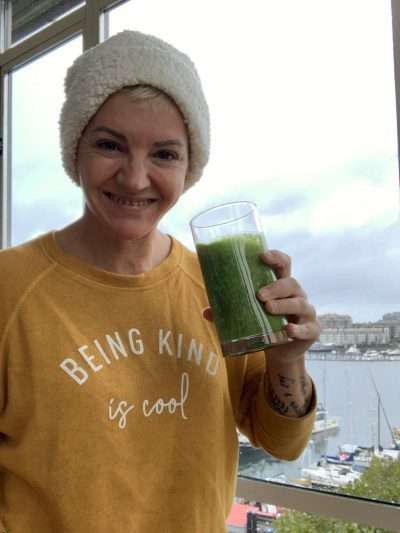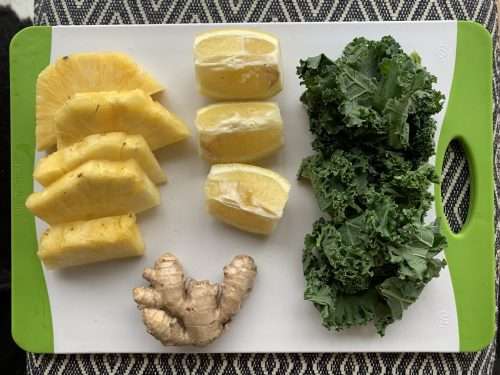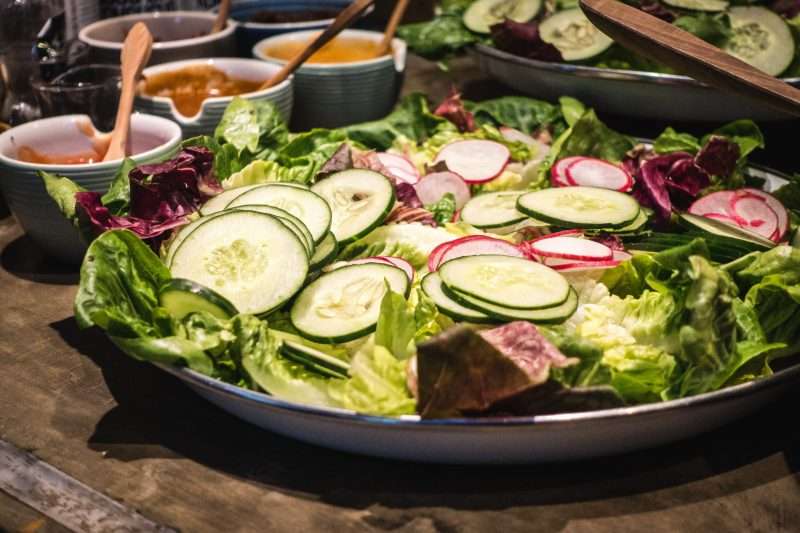October 2, 2019
If your primary goal is weight loss, making this ONE and only “diet” change will likely do it!
The participants in each group averaged 19 grams of fiber a day. Both groups lost weight, lowered their blood pressure, and improved their response to insulin. Those following the AHA diet lost a bit more weight (5.9 pounds) than those on the high-fiber diet (4.6 pounds), but both groups were able to maintain their weight loss for 12 months.
(https://www.health.harvard.edu/)
There are literally tons of studies and research that prove that simply adding more fibre to your diet promotes weight loss, even with no other interventions implemented.

There’s a lot of talk about carbs, calories, and cardio in the world of health, fitness, and weight management. But FIBRE is the silent superfood that’s a key player and it’s sadly overlooked. In fact, there’s such a nation-wide deficit that nutritionists have a name for it – it’s called the fibre gap. Most Canadians are only getting half of the fibre that they need. HALF!
The first thing when we think of fibre is… well, regularity. But fibre doesn’t just help us poop better – it can also help you lose weight, build muscle, optimize your mood, and so much more!
Specifically when it comes to weight management, fibre helps combat fat around your midsection… which is great news, because belly fat is actually super unhealthy. It significantly increases the risk of heart disease, stroke, high cholesterol, and type 2 diabetes -all scary things that we don’t want in our lives!
(Plus, let’s be real here. Who’d say no to a 6-pack midsection?)
Okay, now that we have that out of the way… let’s get down to the nitty gritty.
- Flax seeds
- Legumes (beans, chickpeas, lentils)
- Grains (oats, barley)
- Nuts & seeds
- *** Fruits & vegetables (our favourite!)
I know, I know… we shouldn’t play favourites.
But here’s the deal.
Some high fibre foods – despite being really good for you – can be really calorie-heavy. (Take oatmeal and legumes, for instance.) So when you’re trying to lean out, fruits and veggies are the perfect trifecta:
- high fibre
- low calorie
- packed full of antioxidants and other phytonutrients*
*Phytonutrients are powerful chemical substances that only occur in plants, and are shown to have a plethora of health benefits
As you know, nutrients optimize how your body works for you. Real foods tend to be nutrient dense, but commercially packaged foods have lost much of their nutrients through the process of… well, processing. So it’s important to try to stay away from processed food as much as possible, and instead chose natural and whole forms of high fibre foods.
(pssst… if you want an actual menu plan that takes care of all this for you with yummy recipes, we gotchu covered! We have all kinds of meal plans ready for instant download here. You’re welcome.)
For inquiring minds that geek out on the details… here are some of the specific ways fibre helps you shed body fat:
1. HEALTHIER GUT
Eating a fibre-rich diet is associated with better health all around, and that’s largely due to its benefits to your gut flora, or microbiome. “Did you know that scientists can look at your gut microbiome composition and tell you with 90% accuracy if you’re obese or lean?” Certain gut microbes help shape your body and keep obesity at bay – which means that if you’re having trouble losing weight, the problem might be in your gut.
One of the things scientists know is that fibre “modulates and supports the symbiotic microbial communities that colonize the digestive tract—the gut microbiota”.
Looking to improve:
-
gut health/digestion
-
immunity (less sick days sounds pretty good!)
-
improved athletic recovery
-
balanced mood and energy levels
Increasing your daily fibre intake is a good place to start!
2. HEALTHIER MUCOSA MEMBRANE
Okay, we’re going to talk about mucus. I know. Gross. Mucus, poop, guts. We’re laying it alllll out there today. But stick with us!
Your gastrointestinal tract is lined with a barrier of mucus that protects you from the outside world – it’s actually a part of your immune system. This membrane is covered with a layer of bacteria (yep, part of your microbiome, or gut flora).
Guess what feeds this bacteria? FIBRE.
And if it doesn’t get fed with dietary fibre, it will begin eating the mucosa lining itself. Enter pathogens and increased illness, not to mention all the other disruptions to your gut’s role in regulating a healthy metabolism!
Long story short: gut mucus is good. And it comes from fibre.
3. SATIATES APPETITE
Did you know that fibre is a natural appetite suppressant? It not only reduces the levels of hunger hormones produced by the body (yay, we’ll take all the help we can help with controlling hunger and cravings!), but it also increases the production of hormones that work in opposition – making you feel fuller, for longer. This is science, my friends! We can actually measure the hunger hormones and know that fibre consumption positively influences them. How cool is that?!
4. IMPROVED BLOOD SUGAR BALANCE
Because fibre takes longer to digest, it slows down the absorption of the glucose (or sugars) into the blood stream – not only from the fibre, but also from anything else we eat at the same time!
So if you ate a serving of fibre-rich veggies with your rice, it would slow down the digestion and absorption of sugars from the rice as well.
Wait a minute… that’s a GOOD thing? Why?
It’s the release of sugars from our food into our blood stream that increases blood sugar levels. When this happens too fast, it disrupts our metabolism, appetite, weight, mood, and energy. The faster the release, the more insulin is produced in our bodies to keep our blood sugar levels under control. Fibre fights this by slowing down the digestion of food.
A NOTE ON FIBRE FOR ATHLETES
[/fusion_title][fusion_text columns=”” column_min_width=”” column_spacing=”” rule_style=”default” rule_size=”” rule_color=”” content_alignment_medium=”” content_alignment_small=”” content_alignment=”” hide_on_mobile=”small-visibility,medium-visibility,large-visibility” sticky_display=”normal,sticky” class=”” id=”” font_size=”” fusion_font_family_text_font=”” fusion_font_variant_text_font=”” line_height=”” letter_spacing=”” text_color=”” animation_type=”” animation_direction=”left” animation_speed=”0.3″ animation_offset=””]
All of the above health benefits from fibre go a long way to ultimately enhancing mineral absorption, energy production, and performance and recovery for the athlete. In fact, if you’re an athlete and eating a lot more calories to provide for your increased energy needs (that means more workload for your digestive system) you may need even more fibre than the daily recommended amount (25g women, 38g men).
Additionally, as a high level athlete you’re at increased risk of systemic inflammation, or a chronic inflammatory response activation in your body. This disrupts your gut microbiota, which then further contributes to the inflammatory cycle. Adequate fibre intake from nutrient-dense real food supports the integrity and diversity of your gut microbiota and helps to mitigate this vicious cycle. But… when you eat your fibre may need to be adjusted.
WHEN TO EAT YOUR FIBRE?
As an athlete, you’ll want to reduce your fibre intake around the time of your training sessions. Fibre slows down digestion – great for satiation and appetite control, not so good when you need all your body’s energy directed to your working muscles. As things are being shunted away from digestive organs during high intensity training, a belly full of fibre can result in bloating, gas or sluggishness. Your post-workout smoothie is a great time to add lots of fibre from fresh veggies and fruit.


I like to blend up a big jug of fresh veggies and fruit with plenty of water for a fresh & invigorating juice/shake that is super high in anti-oxidants to help with recovery, natural sugars to replenish glycogen stores, and fibre (because you’ve kept all the pulp in). My favorite is carrots, kale, pineapple, apple, lemon juice, ginger and cinnamon. Don’t forget to add your egg or whey isolate protein powder for protein synthesis post-workout!
IN SUMMARY
We all know that fruits & veggies are good for us, and one of the reasons is that they’re so rich in fibre! Because they’re high in fibre AND low in calories, they help us combat that pesky (and super unhealthy) spare tire around our middle.
We do caution you to increase your fruit & veggie intake slowly if your body isn’t used to it. If you find yourself cramping up or camping out in the bathroom, slow down and gradually increase your intake.
Want to find new ways to include/hide more fibre-rich greens in your diet?
We can help, we’ve got all sorts of tricks!
.
Leave a comment for us below, we appreciate your feedback!
Fight Fat with Fibre
The entire contents of this website are based upon the opinions of Build Holistic Nutrition. Please note that Build Nutrition is not a dietitian, physician, pharmacist or other licensed healthcare professional. The information on this website is NOT intended as medical advice, nor is it intended to replace the care of a qualified health care professional. This content is not intended to diagnose or treat any diseases. Always consult with your primary care physician or licensed healthcare provider for all diagnosis and treatment of any diseases or conditions, for medications or medical advice, as well as before changing your health care regimen.
© BUILD NUTRITION 2026. ALL RIGHTS RESERVED. PRIVACY POLICY
Go ahead, creep us on social. You know you want to!

